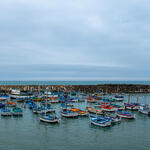- Date: 24 May 2023
- Author: Martha Stevenson, Senior Director of Strategy and Research
Today, the Science Based Targets Network released its first version of nature targets. This is a significant step in uniting the world’s leading companies to stabilize the climate, preserve freshwater resources, regenerate land, secure healthy oceans, and support biodiversity.
We know that business as usual can’t continue. We are exceeding planetary boundaries – the points of no return for nature, climate, and humanity as we know them. You only need to turn to the news to see the devastating effects: wildfires in the boreal, droughts in eastern Brazil, and the empty forests of the Congo, once teeming with biodiversity. These harbingers of what’s to come reflect an ecological system out of balance.
- Date: 28 February 2023
Our oceans provide a range of goods and services, many of which depend on healthy ecosystems.
Global seafood production supports the livelihoods of more than 600 million people, and serves as the primary source of animal protein for approximately 3 billion people. Yet with only about 30 percent of the seafood sold today certified or rated as sustainable, and with more than 30 percent of the world’s fisheries currently over-exploited, unsustainable seafood production poses an immense threat – both to the ecological health of our oceans and to the socio-economic health of the people and companies that depend on them.
- Date: 09 February 2023
As fans from all over the world head to Arizona this weekend for football’s big event, thousands of sustainability professionals won’t be far behind. Greenbiz23 – an annual event for sustainability leaders – kicks off on Tuesday, February 14. Once again, WWF experts from across the organization will lead discussions, provide insights, and connect with like-minded individuals, looking to achieve sustainability solutions at a scale and speed that matters.
If you’re participating in GreenBiz23, we invite you to join an event or session featuring WWF experts and of course come say “hello” during conference networking breaks. Here’s where you can find us:
- Date: 12 July 2022
- Author: Caroline Tippett, Vice President of Ocean Markets and Finance
This is part two of a series that explores what sustainable coastal and marine tourism will look like in 2030 and 2050, and identifies the three key shifts needed by 2025 to achieve this ambitious vision. Part one is available here.
Leading the way hand in hand with businesses
As the leading conservation organization aiming at creating a better future for people and nature, we recognize that we cannot do this alone. WWF engages in our conservation work with communities, governments and companies to create lasting change. That is why WWF has been partnering with some of the world’s leading corporations in the hospitality and tourism sector for over a decade to meet conservation threats, with remarkable response.
One notable case study concerns our work with Royal Caribbean Group to certify its tour operators to the GSTC standard[7]. At WWF’s recommendation, Royal Caribbean Group committed to increasing the sustainability of its tour offerings through the GSTC framework. The company set a target to provide 1,000 tours through operators certified by a GSTC-accredited certification body by 2020, representing about 25–30 percent of its tour portfolio. By December 2020, it had achieved over 2,000 GSTC-certified tours through 33 different tour operators in 29 different countries.
Contributing to this achievement was the thoughtful education of key Royal Caribbean staff and local tour operators on the GSTC standard and certification process and establishing a sustainable procurement policy preferring GSTC-certified tour operators. Royal Caribbean was the first major travel company to adopt preferential purchasing based on GSTC-accredited certification. This has allowed tour operators to proudly help protect the environment while also saving costs. When a shore excursion tour operator is certified, it creates an important multiplier effect, as these operators often provide tours to other cruise lines and travel companies.
WWF additionally piloted three GSTC destination assessments in Honduras and Belize with the German Agency for International Development (GIZ) and Royal Caribbean with the local governments and civil society. Similar sustainable tourism initiatives were carried out in the Philippines together with the company and Donsol. WWF is looking to expand its collaboration with Royal Caribbean in the coming years and build together a broader nature-positive initiative in Belize and other regions. This model has the potential to be replicable with other corporate partners as part of WWF’s nature-positive business strategy.
With leading hotelier Hilton, we also have led transformative freshwater resource initiatives in some of their properties in South Africa during the devastating drought. WWF is exploring collaboration with Hilton to design destination stewardship initiatives to improve seafood sourcing, influence customer behavior and further area-based restoration efforts.
Takeaway
Nature-positive tourism is not only possible but necessary if we want to meet ocean conservation ambitions by 2030. There is reason to be hopeful, with the growing engagement from governments and the financial and hospitality sectors, but an awful lot of work is still needed to bend the curve of decline in nature and climate change. To maintain the natural capital on which the tourism business model is based, businesses need to act now, before the scenic beaches and marine ecosystems tourists seek are wiped away by unsustainable developments and climate change. There is also strong momentum in the finance community to redirect capital flows towards nature-positive businesses; this should be harnessed to accelerate the transition for the benefit of people, planet and peace.
##
[6] IPCC reports. https://www.ipcc.ch/reports/.
[7] GSTC. Royal Caribbean’s 2020 Sustainability Report. https://www.gstcouncil.org/royal-caribbeans-2020-sustainability-report/.



